英语使役动词用法详细讲解与练习
使役动词的用法详解(用))

使役动词的用法详解使役动词1.使役动词是表示使、令、让、帮、叫等意义的不完全及物动词,主要有leave.get.keep.make(使,令),let(让),help(帮助), have(有;让;从事;允许;拿)等。
2.使役动词后接受词,再接原形不定词作受词补语。
接宾语时,人称代词用宾格。
He made me(宾格)laugh.他使我发笑。
I let him go.我让他走开。
I helped him repair the car.我帮他修理汽车。
Please have him come here.请叫他到这里来。
3.使役动词还可以接过去分词作受词补语。
I have my hair cut every month.我每个月理发。
4.使役动词的被动语态的受词补语用不定词,不用原形不定词。
(主)He made me laugh.他使我笑了。
(被)I was made to laugh by him.我被他逗笑了。
使役动词有以下用法:a.have somebody do sth让某人去做某事I had him arrange for a car.b.have somebody doing sth.让某人持续做某事。
He had us laughing all through lunch.注意:用于否定名时,表示“允许”i won't have you running around in the house.我不允许你在家里到处乱跑。
“使役动词”的用法1.have sb do让某人干某事e.g:What would you have me do?have sb/sth doing让某人或某事处于某种状态,听任e.g:I won't have women working in our company. The two cheats had the light burning all night long. have sth done让别人干某事,遭受到e.g:you'd better have your teeth pulled out.He had his pocket picked.notes:"done"这个动作不是主语发出来的。
使役动词的用法 详解

使役动词使役动词1.使役动词是表示使、令、让、帮、叫等意义的不完全及物动词,主要有leave.get.keep.make(使,令), let(让), help(帮助), have(有;让;从事;允许;拿)等。
2.使役动词后接受词,再接原形不定词作受词补语。
接宾语时,人称代词用宾格。
He made me(宾格) laugh.他使我发笑。
I let him go.我让他走开。
I helped him repair the car.我帮他修理汽车。
Please have him come here.请叫他到这里来。
3.使役动词还可以接过去分词作受词补语。
I have my hair cut every month.我每个月理发。
4.使役动词的被动语态的受词补语用不定词,不用原形不定词。
(主)He made me laugh.他使我笑了。
(被)I was made to laugh by him.我被他逗笑了。
使役动词有以下用法:a. have somebody do sth让某人去做某事I had him arrange for a car.b. have somebody doing sth.让某人持续做某事。
He had us laughing all through lunch.注意:用于否定名时,表示“允许”i won't have you running around in the house.我不允许你在家里到处乱跑。
小议“使役动词”的用法1. have sb do让某人干某事e.g:What would you have me do?have sb/sth doing 让某人或某事处于某种状态,听任e.g: I won't have women working in our company.The two cheats had the light burning all night long.have sth done让别人干某事,遭受到e.g:you 'd better have your teeth pulled out.He had his pocket picked.notes: "done"这个动作不是主语发出来的。
(完整版)使役动词的用法
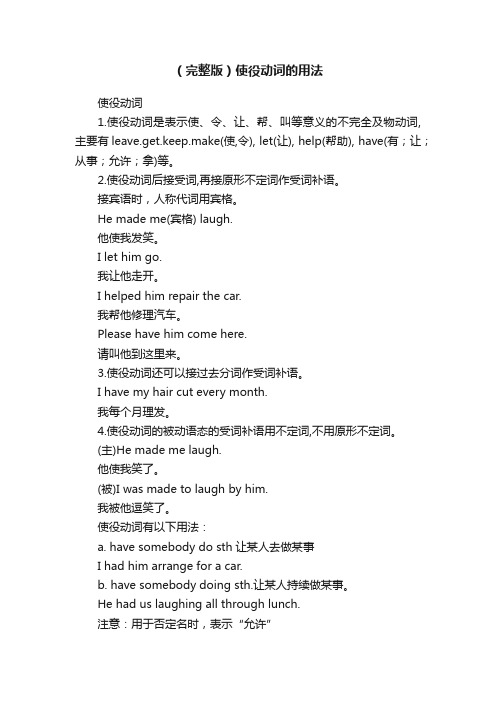
(完整版)使役动词的用法使役动词1.使役动词是表示使、令、让、帮、叫等意义的不完全及物动词,主要有leave.get.keep.make(使,令), let(让), help(帮助), have(有;让;从事;允许;拿)等。
2.使役动词后接受词,再接原形不定词作受词补语。
接宾语时,人称代词用宾格。
He made me(宾格) laugh.他使我发笑。
I let him go.我让他走开。
I helped him repair the car.我帮他修理汽车。
Please have him come here.请叫他到这里来。
3.使役动词还可以接过去分词作受词补语。
I have my hair cut every month.我每个月理发。
4.使役动词的被动语态的受词补语用不定词,不用原形不定词。
(主)He made me laugh.他使我笑了。
(被)I was made to laugh by him.我被他逗笑了。
使役动词有以下用法:a. have somebody do sth让某人去做某事I had him arrange for a car.b. have somebody doing sth.让某人持续做某事。
He had us laughing all through lunch.注意:用于否定名时,表示“允许”i won't have you running around in the house.我不允许你在家里到处乱跑。
小议“使役动词”的用法1. have sb do 让某人干某事e.g:What would you have me do?have sb/sth doing 让某人或某事处于某种状态,听任e.g: I won't have women working in our company.The two cheats had the light burning all night long.have sth done 让别人干某事,遭受到e.g:you 'd better have your teeth pulled out.He had his pocket picked.notes: "done"这个动作不是主语发出来的。
(完整版)英语使役动词用法
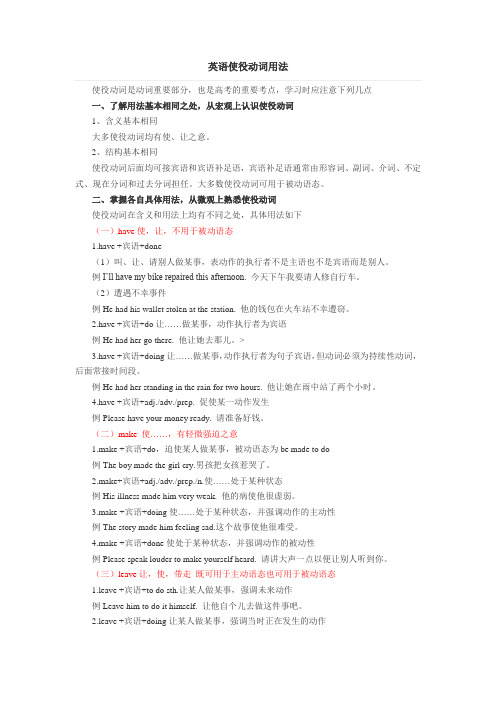
英语使役动词用法使役动词是动词重要部分,也是高考的重要考点,学习时应注意下列几点一、了解用法基本相同之处,从宏观上认识使役动词1、含义基本相同大多使役动词均有使、让之意。
2、结构基本相同使役动词后面均可接宾语和宾语补足语,宾语补足语通常由形容词、副词、介词、不定式、现在分词和过去分词担任。
大多数使役动词可用于被动语态。
二、掌握各自具体用法,从微观上熟悉使役动词使役动词在含义和用法上均有不同之处,具体用法如下(一)have使,让,不用于被动语态1.have +宾语+done(1)叫、让、请别人做某事,表动作的执行者不是主语也不是宾语而是别人。
例I’ll have my bike repaired this afternoon. 今天下午我要请人修自行车。
(2)遭遇不幸事件例He had his wallet stolen at the station. 他的钱包在火车站不幸遭窃。
2.have +宾语+do让……做某事,动作执行者为宾语例He had her go there. 他让她去那儿。
>3.have +宾语+doing让……做某事,动作执行者为句子宾语,但动词必须为持续性动词,后面常接时间段。
例He had her standing in the rain for two hours. 他让她在雨中站了两个小时。
4.have +宾语+adj./adv./prep. 促使某一动作发生例Please have your money ready. 请准备好钱。
(二)make 使……,有轻微强迫之意1.make +宾语+do,迫使某人做某事,被动语态为be made to do例The boy made the girl cry.男孩把女孩惹哭了。
2.make+宾语+adj./adv./prep./n.使……处于某种状态例His illness made him very weak. 他的病使他很虚弱。
关于英语语法中使役动词的用法详细分析

关于英语语法中使役动词的用法详细分析使役意义状态动词get, leave, set, send, keep, drive, etc.常用于复合结构中)1. get:使成为/变得某种状态或结果。
I can’t get the old radio to work.我无法让那旧收音机工作起来。
(接带to不定式作宾补)Can you really get that old car going again?你真能让那旧车运转起来吗?The farmer got his planting done before the rain came.那农民在雨季前完成了种植。
He got his wrist broken.他折断了手腕。
(主语发生了不幸的事)She soon got the children ready for school.她迅速使孩子们做好了上学准备。
2. leave:使保持/处于某种状态Leave your hat and coat in the hall.把帽子和外套放在大厅里。
Did you leave the doors and windows firmly fastened?你把门窗紧紧锁上了吗?Always leave things where you can find them again.总应把东西放在能再次找到的地方。
Who left that window open?谁让窗户开着?Don’t leave him waiting outside in the rain.别让他在外面雨中等待。
Leave somebody / something alone.不要干涉某人或某事。
3. set:使某人或某物处于或达到某种特殊的状态或关系set somebody at his ease 使某人安逸/舒适/心情放松set something in order 使某物井然有序。
使役动词的用法及练习

英语中具有使役意义的动词较多,跟人们常常说的使役动词不是一个概念.通常我们说使役动词,指的是make,have,let 这三个动词,它们在后接不定式作宾语补足语时要省去不定式符号to 的特定用法.但具有使役意义的动词数量上远不止这些,用法也较灵活,现将其分类叙述如下,以饷读者.(注:英语动词意义丰富,在此仅限于“使役”意义.)1使役动词have, let, make (常用于复合结构)1.1 have 的用法1). have +宾语+省to 不定式:表示主语“要”使“”让“”宾语干某事,宾语和宾补之间是一种主动关系.而且还可以与情态动词will, would 连用,不用于被动结构.The rich lady had the singer eat with his servants.2). have+宾语+现在分词:表示让某人或物连续进行某动作或处于某状态中,宾语和宾补是一种主动关系.亦可转化为“劝说,鼓励”宾语干某事.The two cheats had the lights burning all night long.He had us waiting for him three hours yesterday.I have them all talking to each other in English我. 鼓励他们用英语交谈.3).have+宾语+过去分词:表示主语的主观意志,即主语让别人为自己完成某事,宾语和宾补是动宾关系还可以表示主语遭受到来利或不测的事.Tom said he had had his TV set repaired.Tom had his wallet stolen on the bus yesterday.“别人”在句中一般不出现,这是它与结构1)的区别所在.试比较:Have you washed your clothes?你洗了衣服了吗?(自己洗)Have you had your clothes washed?你叫人洗了衣服了吗?(别人洗)4) . have+宾语+形容词/副词/介词短语作宾补The Emperor had nothing on.I am sure I ' ll have hthime ainr gument.1.2let 的用法1) . let +宾语+省to 不定式:表示主语“要”使“”让“”宾语干某事,宾语和宾补之间是一种主动关系,罕用于被动语态.有时也可指一种假设.let 后不能接现在分词,过去分词作宾补.Let them stay in the classroom and do their exercises themselves.Let AB be equal toCD.假设AB 等于CD.2) . let+宾语+副词/介词短语作宾补Let me in and let them out.Who let you into the building?3.make 的用法1). make +宾语+省to 不定式:表示主语“要”使“”让“”宾语干某事,宾语和宾补之间是一种主动关系.此结构常用被动结构.make 后不接现在分词作宾补.The teacher made the naughty boy stand there for an hour.The naughty boy was made to stand there for an hour.2).make+宾语+过去分词,此结构中的宾语指人时常用到反身代词.He raised his voice to make himself heard.Can you easily make yourself understood in English?They will make an important plan known to the public soon.3). make+宾语+形容词,宾语亦可是从句.The news made her happy.He made it clear that he objected to the proposal.“半使役动词”在英语语法上还是一个没有被认同的概念或术语,而只是认可了其v-ing 形式和v-ed 形式作为形容词使用.但这类词汇数量较大,使用频率高,业已成为学习和考查中的重点,难点,易混易错点,而且在教学一线已经广泛地被教师和学生所接受.半使役动词之所以得名,一则它们的意义都有“使某人感到⋯⋯”再, 则是为了与具有特殊用法的使役动词let, have, make 等区别开来.2.4 常见的半使役动词amaze(使某人感到惊呀), astonish(使某人感到惊奇),confuse(使某人感到迷惑), disappoint(使某人感到失望),delight (使某人感到高兴), discourage(使某人感到气馁),distinguish(使某人感到显著), excite(使某人感到兴奋),encourage(使某人感到鼓舞), exhaust(使某人感到疲倦),frighten (使某人感到恐惧), interest(使某人感到有趣),inspire(使某人感到刺激), move(使某人感到激动),please(使某人感到高兴), puzzle(使某人感到不解),satisfy(使某人感到满意), surprise(使某人感到惊异),shock(使某人感到震惊), strike(使某人感到震动),tire (使某人感到疲惫), upset(使某人感到迷惑不解),等等.2.2 半使役动词的主动式用法:something + Vt. + somebody如:What surprised him most was her bravery. His brave deeds moved China.The exam result satisfied his parents. The boy ' s behavior upset everybody around.2.3 半使役动词有两个或三个派生形容词,一个加-ing,一个加-ed,有时还有一个加其他后缀构成please --- p leasing, pleased, pleasant; satisfy --- s atisfying, satisfied, satisfactory.2.4半使役动词的v-ing和v-ed两个分词形容词的用法也有规律一般而言,作定语时,v-ing分词形容词修饰事物,v-ed分词形容词修饰人或者人的心理活动,表情等;作表语或宾语补足语时,v-ing 分词形容词指事;v-ed 分词形容词指人或拟人用法.而且作表语的v-ed 分词后接事时常有一个介词.如:The film we saw last night was very interesting.We were all interested in the film.The frightening hurricane made the girl very frightened.The teacher was satisfied with the answer of his students.3 使役意义状态动词get, leave, set, send, keep, drive, etc常. 用于复合结构中3.1get 使成为/变得某种状态或结果(get 的用法跟have很接近)I can ' t get the old radio to wo我rk无. 法让那旧收音机工作起来(.接带to 不定式作宾补)Can you really get that old car going again你? 真能让那旧车运转起来吗?The farmer got his planting done before the rain came.那农民在雨季前完成了种植.He got his wrist broken.他折断了手腕.(主语发生了不幸的事)She soon got the children ready for school她. 迅速使孩子们做好了上学准备.3.2leave 使保持/ 处于某种状态Leave your hat and coat in the hall.把帽子和外套放在大厅里.Did you leave the doors and windows firmly fastened?你把门窗紧紧锁上了吗?Always leave things where you can find them again总. 应把东西放在能再次找到的地方.Who left that window open? 谁让窗户开着?Don't leave him waiting outside in the rain别. 让他在外面雨中等待.Leave somebody / something alone.不要干涉某人或某事.3.3set 使某人或某物处于或达到某种特殊的状态或关系set somebody at his ease使某人安逸/ 舒适/心情放松set something in order 使某物井然有序set somebody free / at liberty 使某人获得自由,释放(犯人等)It 's time we set the machine goi是ng我. 们发动机器的时候了.The news set me thinking.这消息使我陷入了沉思.He set the farm laborer to chop wood.他让农场工人去砍伐木材.I have set myself to finish the job by the end of May.我决心于五月底前完成那工作.set a thief to catch a thief.以毒攻毒;令贼捉贼3.4 send 使某人或某物急剧地移动The earthquake sent the crockery and cutlery crashing to the ground地. 震将杯盘刀叉震落在地上.Mind how you go --- you nearly sent me flying.小心点,你差点将我撞飞了.Send that fellow about his business / packing.叫那家伙滚蛋.The good harvest sent the prices down.丰收使物价下跌.3.5drive 使某人处于某状态,迫使某人做某事Failure drove him to despair / desperation.失败使他绝望.You' ll drive me mad / to my wits 你会把'我气en疯d.的./你会使我穷尽应付的.Hunger drove him to steal. = He was driven by hunger to stea他l. 为饥饿所迫而偷窃.3.6keep 使某人或某物保持某种状态You should keep the children quiet.你要使孩子们静下来.The cold weather kept us indoors.寒冷的天气使我们待在家里.If your hands are cold, keep them in your pockets.如果你手冷,把它们放在口袋里.I 'm sorry I 've kept you w很ai报tin歉g.让你久等了.The doctors managed to keep me going医. 生们设法让我活下去.4 使役意义动态动词4.1cause致使,导致(能接直接宾语,双宾语,复合宾语)What caused his death?什么导致了他的死亡?This has caused us much anxiety这. 给我们带来了极大的忧虑.What caused the plants to die.( =what made them die.)什么使得这些植物枯死.He caused the prisoner to be put to death. (=he had them put to death.)他使得这些犯人被处死.4.2force 迫使,强迫(宾语后常接介词短语、副词及不定式等)force one 's way through a cro从w人d 群中挤出一条路来.force a way in / out / through 冲入/ 出/过force an entry into a building 强行进入一建筑force the war upon him 强迫某人作战force someone into doing something 强迫某人做某事force sb./ oneself to work hard 迫使某人/ 自己努力工作英语中使役动词的用法较复杂,上面仅就常见常用类作一小结,以供大家参考,还有一些类型可能未被总结出来,初中部分一haveletmake 为重使役动词练习一、单项选择1.I have heard both teachers and students __well of him.A to speakB spokenC to have spokenD speak2.They are going to have theserviceman__ an electric fan.A installB to installC to be installedD installedA to be arrestedB arrestC arrestedD being arrested4.They know her very well. They had seen her ___upA growB grewC was growingD to grow5.Is this fridge__you wish to have ___?A the one, it repairedB that, repaired itC the one, repairedD which, repaired6.When visiting a foreign country, I sometimes found it difficult __.Amaking understand meBto make myself understoodCto make myself understand7.---Good morning, Can I help you?---I ' dlike to have this package _,__madamAbe weighedB to be weighedC to weighD weighed8.The speaker raised his voice but still could not make himself __.A hearB having heardC hearingD heard9.Jane was made to ___the truck for a week as a punishment.A to washB washingC to be washingD wash10.The missing boys were last seen __near the river.A playingB to be playingC playD playing11.The police were told that some boys were seen ___on the street.A playingB to be playingC playDto playing12.Pauldoesn ' thave to be made ___.He always works hard.A to learnB learnC learnedD learning13.Ellen was absent this morning, she had her teeth ___.14.The manager discussed the plan that they would like to see ___the next door.Acarry outBcarrying outCcarried outDto carry out15.If you want to buy an expensive camera,we have several models ___.Ato be chosenBto choose fromCto chooseDfor choosing16.The examiner made us __our identification in order to be admitted to the text center.A showingB showC showedD to show17.We were told to have our reading room __after school.AcleanBto cleanCcleaningDcleaned18.They made a fire ___up the room, as soon as their leader cameback.AwarmBwarmedCto warmDwarming19.I often noticed the boy ___school alone very soon.A leaveB leftC leavingD to notice20.Thepeople ' sgovernment doesit best to having the living standard of the people __.ArisenBraiseCriseDraised21.Your brother looks tired,What ' swrong with him ?-- Well,that ' sbecause his boss had him __all day.AworksBto workC workingDworked22.Jenny hopes that Mr. Smith will suggest a good way to have her written English __in ashort period.AimprovedBimprovingCto improveDimprove23.Did you notice the little boy __away?Atook the candy and runBtaking the candy and run24.I smell something ___in the kitchen, can I call you back in aminute?AburningBburntCbeing burntDto be burnt二、用所给动词适当形式填空1Hedidn ' tpass the exam..I found him ____ (f_ru_strate)2I like my Chinese teacher. He always makes his classes(interest)3. Jim noticed a purse ____ (lie) on the ground on his way to school.4. The boy saw a basket ____ (hang) in the tree.5. My father usually gets me ___ (water) the plant.6. The teacher was angry. He kept the boy ____ (stand) there.7. Let the little girl ____ (sit) down.8. When the teacher came in I noticed him _____ (smile).9. I saw the light _ (亮着) and the door _____ .(关着).10. Hismother ' sbike is broken. She willi th _a_ve_ __(repair).11. ___________________________ The students are often made (take) different extra classes afterschool.12. He was often heard ____ (sing) English songs.三、将下列句子变成动语态1. I saw him listening tothe radio just now.2. His mother made him clean the room yesterday.3.Our teacher often makesme laugh in class.。
使役动词的用法
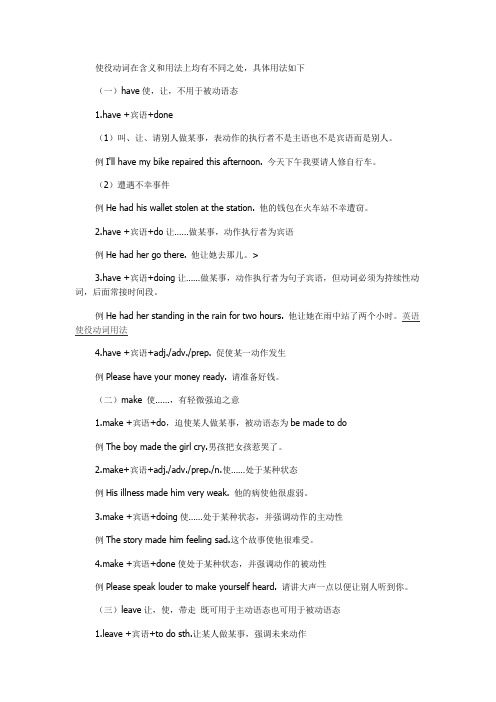
使役动词在含义和用法上均有不同之处,具体用法如下(一)have使,让,不用于被动语态1.have +宾语+done(1)叫、让、请别人做某事,表动作的执行者不是主语也不是宾语而是别人。
例I'll have my bike repaired this afternoon. 今天下午我要请人修自行车。
(2)遭遇不幸事件例He had his wallet stolen at the station. 他的钱包在火车站不幸遭窃。
2.have +宾语+do让……做某事,动作执行者为宾语例He had her go there. 他让她去那儿。
>3.have +宾语+doing让……做某事,动作执行者为句子宾语,但动词必须为持续性动词,后面常接时间段。
例He had her standing in the rain for two hours. 他让她在雨中站了两个小时。
英语使役动词用法4.have +宾语+adj./adv./prep. 促使某一动作发生例Please have your money ready. 请准备好钱。
(二)make 使……,有轻微强迫之意1.make +宾语+do,迫使某人做某事,被动语态为be made to do例The boy made the girl cry.男孩把女孩惹哭了。
2.make+宾语+adj./adv./prep./n.使……处于某种状态例His illness made him very weak. 他的病使他很虚弱。
3.make +宾语+doing使……处于某种状态,并强调动作的主动性例The story made him feeling sad.这个故事使他很难受。
4.make +宾语+done使处于某种状态,并强调动作的被动性例Please speak louder to make yourself heard. 请讲大声一点以便让别人听到你。
(免费)使役动词的用法-详解
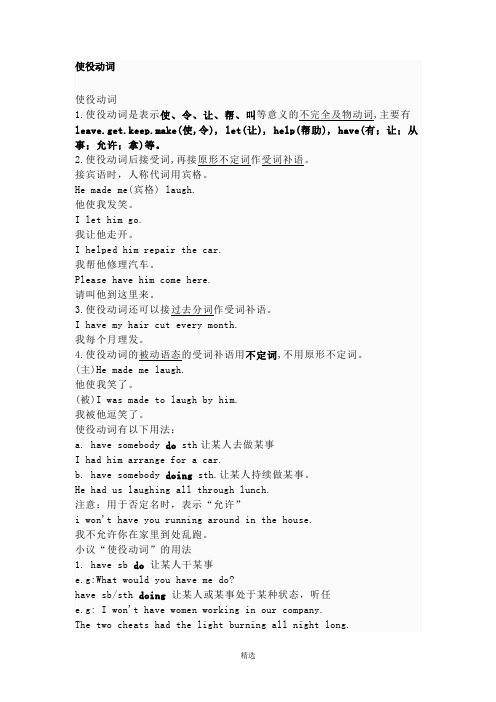
使役动词使役动词1.使役动词是表示使、令、让、帮、叫等意义的不完全及物动词,主要有leave.get.keep.make(使,令), let(让), help(帮助), have(有;让;从事;允许;拿)等。
2.使役动词后接受词,再接原形不定词作受词补语。
接宾语时,人称代词用宾格。
He made me(宾格) laugh.他使我发笑。
I let him go.我让他走开。
I helped him repair the car.我帮他修理汽车。
Please have him come here.请叫他到这里来。
3.使役动词还可以接过去分词作受词补语。
I have my hair cut every month.我每个月理发。
4.使役动词的被动语态的受词补语用不定词,不用原形不定词。
(主)He made me laugh.他使我笑了。
(被)I was made to laugh by him.我被他逗笑了。
使役动词有以下用法:a. have somebody do sth让某人去做某事I had him arrange for a car.b. have somebody doing sth.让某人持续做某事。
He had us laughing all through lunch.注意:用于否定名时,表示“允许”i won't have you running around in the house.我不允许你在家里到处乱跑。
小议“使役动词”的用法1. have sb do让某人干某事e.g:What would you have me do?have sb/sth doing 让某人或某事处于某种状态,听任e.g: I won't have women working in our company.The two cheats had the light burning all night long.have sth done让别人干某事,遭受到e.g:you 'd better have your teeth pulled out.He had his pocket picked.notes: "done"这个动作不是主语发出来的。
使役动词知识点总结

使役动词知识点总结一、使役动词的基本用法1.1 使役动词的基本功能是通过对宾语的动作实施控制,使其发生某种动作或者状态。
比如:- She made him clean the room.(她让他打扫房间)- He had her sing a song.(他让她唱首歌)- They got him to confess.(他们促使他招供)1.2 有时候,使役动词的宾语可以是动词不定式,表示被控制的动作或者状态。
比如:- She made him study hard.(她让他用功学习)- They had her do the dishes.(他们让她洗碗)- The teacher got the students to listen to his lecture.(老师让学生们听他的讲座)1.3 使役动词也可以接双宾语,表示被控制的人和动作的对象。
比如:- She made him a cake.(她给他做了一个蛋糕)- They had their car repaired.(他们让修了他们的汽车)- The boss got his employees new uniforms.(老板让员工们换了新的制服)二、常见的使役动词和它们的语法结构2.1 make“make”是最常见的使役动词之一,其语法结构比较简单,后面可以接宾语和动词原形或者动词不定式。
比如:- make + 宾语 + 动词原形She made him clean the room.(她让他打扫房间)- make + 宾语 + 动词不定式She made him study hard.(她让他用功学习)2.2 have“have”也是常见的使役动词,其语法结构与“make”类似,后面同样可以接宾语和动词原形或者动词不定式。
比如:- have + 宾语 + 动词原形He had her sing a song.(他让她唱首歌)- have + 宾语 + 动词不定式They had her do the dishes.(他们让她洗碗)2.3 get“get”同样可以表示使役的意思,其语法结构也和“make”、“have”类似。
使役动词的用法以及50道练习题(附答案)

使役动词have let make 的用法1.have的用法1). have 宾语省to不定式:表示主语“要”“使”“让”宾语干某事,宾语和宾补之间是一种主动关系.而且还可以与情态动词will, would连用,不用于被动结构.The rich lady had the singer eat with his servants.I will have him come and help you.2). have 宾语现在分词:表示让某人或物连续进行某动作或处于某状态中,宾语和宾补是一种主动关系.亦可转化为“劝说,鼓励”宾语干某事.The two cheats had the lights burning all night long.He had us waiting for him three hours yesterday.I have them all talking to each other in English. 我鼓励他们用英语交谈.3). have 宾语过去分词:表示主语的主观意志,即主语让别人为自己完成某事,宾语和宾补是动宾关系.还可以表示主语遭受到来利或不测的事.Tom said he had had his TV set repaired.Tom had his wallet stolen on the bus yesterday.“别人”在句中一般不出现,这是它与结构1)的区别所在.试比较:Have you washed your clothes? 你洗了衣服了吗?(自己洗)Have you had your clothes washed? 你叫人洗了衣服了吗?(别人洗)4). have 宾语形容词/副词/介词短语作宾补Please have your tickets ready.The Emperor had nothing on.I am sure I’ll have him in the argument.2.let的用法1). let 宾语省to不定式:表示主语“要”“使”“让”宾语干某事,宾语和宾补之间是一种主动关系,罕用于被动语态.有时也可指一种假设.let后不能接现在分词,过去分词作宾补.Let them stay in the classroom and do their exercises themselves.Let AB be equal to CD. 假设AB等于CD.2). let 宾语副词/介词短语作宾补Let me in and let them out.Who let you into the building?3.make的用法1). make 宾语省to不定式:表示主语“要”“使”“让”宾语干某事,宾语和宾补之间是一种主动关系.此结构常用被动结构.make后不接现在分词作宾补.The teacher made the naughty boy stand there for an hour.The naughty boy was made to stand there for an hour.2).make 宾语过去分词,此结构中的宾语指人时常用到反身代词.He raised his voice to make himself heard.Can you easily make yourself understood in English?They will make an important plan known to the public soon.3). make 宾语形容词,宾语亦可是从句.The news made her happy.He made it clear that he objected to the proposal.let用法三注意:注意一:用作使役动词,表示“让”,其后接不定式的复合结构时,不定式不带 to。
使役动词讲解与练习.doc
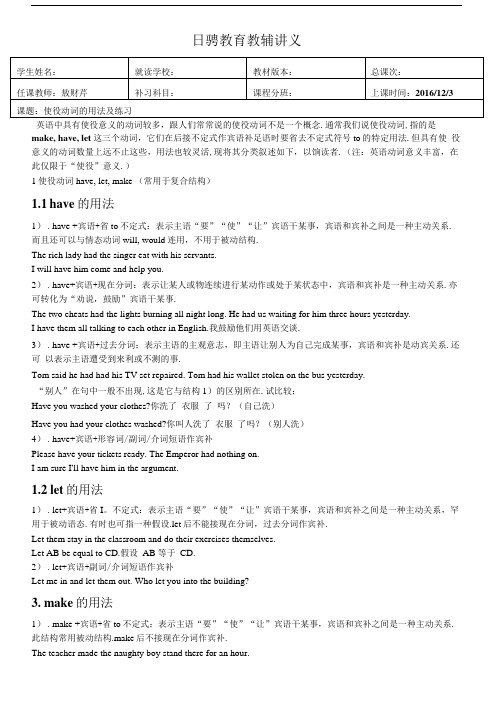
日骋教育教辅讲义英语中具有使役意义的动词较多,跟人们常常说的使役动词不是一个概念.通常我们说使役动词,指的是make, have, let这三个动词,它们在后接不定式作宾语补足语时要省去不定式符号to的特定用法.但具有使役意义的动词数量上远不止这些,用法也较灵活,现将其分类叙述如下,以饷读者.(注:英语动词意义丰富,在此仅限于“使役”意义.)1使役动词have, let, make (常用于复合结构)1.1have的用法1) . have +宾语+省to不定式:表示主语“要”“使”“让”宾语干某事,宾语和宾补之间是一种主动关系. 而且还可以与情态动词will, would连用,不用于被动结构.The rich lady had the singer eat with his servants.I will have him come and help you.2) . have+宾语+现在分词:表示让某人或物连续进行某动作或处于某状态中,宾语和宾补是一种主动关系.亦可转化为“劝说,鼓励”宾语干某事.The two cheats had the lights burning all night long. He had us waiting for him three hours yesterday.I have them all talking to each other in English.我鼓励他们用英语交谈.3) . have +宾语+过去分词:表示主语的主观意志,即主语让别人为自己完成某事,宾语和宾补是动宾关系.还可以表示主语遭受到来利或不测的事.Tom said he had had his TV set repaired. Tom had his wallet stolen on the bus yesterday.“别人”在句中一般不出现,这是它与结构1)的区别所在.试比较:Have you washed your clothes?你洗了衣服了吗?(自己洗)Have you had your clothes washed?你叫人洗了衣服了吗?(别人洗)4) . have+宾语+形容词/副词/介词短语作宾补Please have your tickets ready. The Emperor had nothing on.I am sure I'll have him in the argument.1.2let的用法1) . let+宾语+省I。
英语使役动词用法详细讲解与练习共41页文档

56、书不仅是生活,而且是现在、过 去和未 来文化 生活的 源泉。 ——库 法耶夫 57、生命不可能有两次,但许多人连一 次也不 善于度 过。— —吕凯 特 58、问渠哪得清如许,为有源头活水来 。—— 朱熹 59、我的努力求学没有得到别的好处, 只不过 是愈来 愈发觉 自己的 无知。 ——笛 卡儿
英语使役动词用法详细讲解与练习
51、没有哪个社会可以制订一部永远 适用的 宪法, 甚至一 条永远 适用的 法律。 ——杰 斐逊 52、法律源于人的自卫本能。——英 格索尔
53、人们通常会发现,法律就是这样 一种的 网,触 犯法律 的人, 小的可 以穿网 而过, 大的可 以破网 而出, 只有中 等的才 会坠入 网中。 ——申 斯通 54、法律就是法律它是一座雄伟的大 夏,庇 护着我 们大家 ;它的 每一块 砖石都 垒在另 一块砖 石上。 ——高 尔斯华 绥 55、今天的法律未必明天仍是法律。 ——罗·伯顿
使役动词全解

使役动词全解Document serial number【KK89K-LLS98YT-SS8CB-SSUT-SST108】使役动词1.使役动词是表示使、令、让、帮、叫等意义的,主要有2.使役动词后接受词,再接作。
接宾语时,人称代词用宾格。
He made me(宾格) laugh. 他使我发笑。
I let him go. 我让他走开。
I helped him repair the car. 我帮他修理汽车。
Please have him come here.请叫他到这里来。
3.使役动词还可以接作受词补语。
I have my hair cut every month. 我每个月理发。
4.使役动词的的受词补语用不定词,不用原形不定词。
(主)He made me laugh. 他使我笑了。
(被)I was made to laugh by him. 我被他逗笑了。
使役动词有以下用法:a. have somebody do sth让某人去做某事I had him arrange for a car.b. have somebody doing sth.让某人持续做某事。
He had us laughing all through lunch.注意:用于否定名时,表示“允许”i won't have you running around in the house.我不允许你在家里到处乱跑。
********小议“使役动词”的用法1. have sb do 让某人干某事 e.g:What would you have me do?have sb/sth doing 让某人或某事处于某种状态,听任e.g: I won't have women working in our company.The two cheats had the light burning all night long.have sth done 让别人干某事,遭受到e.g:you 'd better have your teeth pulled out.He had his pocket picked.notes: "done"这个动作不是主语发出来的。
使役动词的用法以及50道练习题(附答案)

使役动词的用法以及50道练习题(附答案)1) Have的用法1.Have宾语省to不定式:表示主语“要”“使”“让”宾语干某事,宾语和宾补之间是一种主动关系。
而且还可以与情态动词will。
would连用,不用于被动结构。
例如:The rich lady hadthe singer eat with his servants。
我让这位歌手和我的仆人一起用餐。
I will have him come and help you。
我会让他来帮助你。
2.Have宾语现在分词:表示让某人或物连续进行某动作或处于某状态中,宾语和宾补是一种主动关系。
也可转化为“劝说,鼓励”宾语干某事。
例如:The two XXX。
这两个骗子让灯整夜亮着。
He had us waiting for him three hours XXX。
昨天他让我们等了他三个小时。
I have them all talking to each other in English。
我鼓励他们用英语交谈。
3.Have宾语过去分词:表示主语的主观意志,即主语让别人为自己完成某事,宾语和宾补是动宾关系。
还可以表示主语遭受到来利或不测的事。
例如:Tom said he had had his TV set repaired。
XXX说他已经修好了电视。
XXX had XXX昨天XXX在公交车上被偷了钱包。
别人”在句中一般不出现,这是它与结构1)的区别所在。
试比较:Have you washed your clothes。
你洗了衣服了吗?(自己洗) Have you had your clothes washed。
你叫人洗了衣服了吗?(别人洗)4.Have宾语形容词/副词/介词短语作宾补。
例如:Please have your tickets ready。
请准备好你的票。
The Emperor had nothing on。
皇帝什么也没穿。
I am XXX I’ll have him in the argument。
(完整版)英语使役动词用法
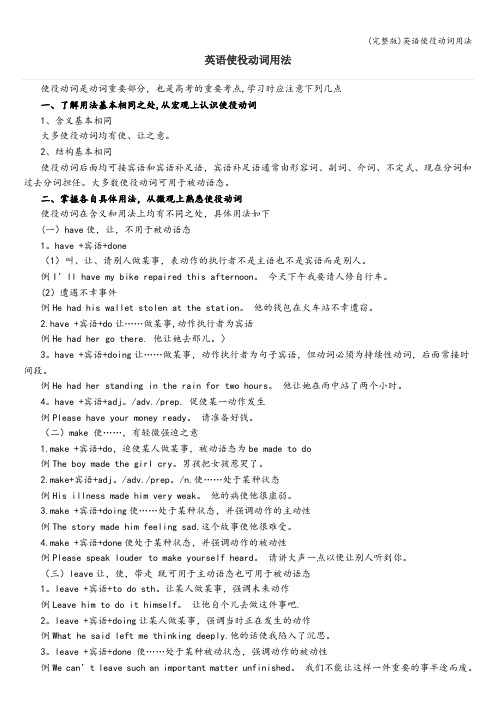
英语使役动词用法使役动词是动词重要部分,也是高考的重要考点,学习时应注意下列几点一、了解用法基本相同之处,从宏观上认识使役动词1、含义基本相同大多使役动词均有使、让之意。
2、结构基本相同使役动词后面均可接宾语和宾语补足语,宾语补足语通常由形容词、副词、介词、不定式、现在分词和过去分词担任。
大多数使役动词可用于被动语态。
二、掌握各自具体用法,从微观上熟悉使役动词使役动词在含义和用法上均有不同之处,具体用法如下(一)have使,让,不用于被动语态1。
have +宾语+done(1)叫、让、请别人做某事,表动作的执行者不是主语也不是宾语而是别人。
例I’ll have my bike repaired this afternoon。
今天下午我要请人修自行车。
(2)遭遇不幸事件例He had his wallet stolen at the station。
他的钱包在火车站不幸遭窃。
2.have +宾语+do让……做某事,动作执行者为宾语例He had her go there. 他让她去那儿。
〉3。
have +宾语+doing让……做某事,动作执行者为句子宾语,但动词必须为持续性动词,后面常接时间段。
例He had her standing in the rain for two hours。
他让她在雨中站了两个小时。
4。
have +宾语+adj。
/adv./prep. 促使某一动作发生例Please have your money ready。
请准备好钱。
(二)make 使……,有轻微强迫之意1.make +宾语+do,迫使某人做某事,被动语态为be made to do例The boy made the girl cry。
男孩把女孩惹哭了。
2.make+宾语+adj。
/adv./prep。
/n.使……处于某种状态例His illness made him very weak。
他的病使他很虚弱。
3.make +宾语+doing使……处于某种状态,并强调动作的主动性例The story made him feeling sad.这个故事使他很难受。
关于英语语法中使役动词的用法详细分析
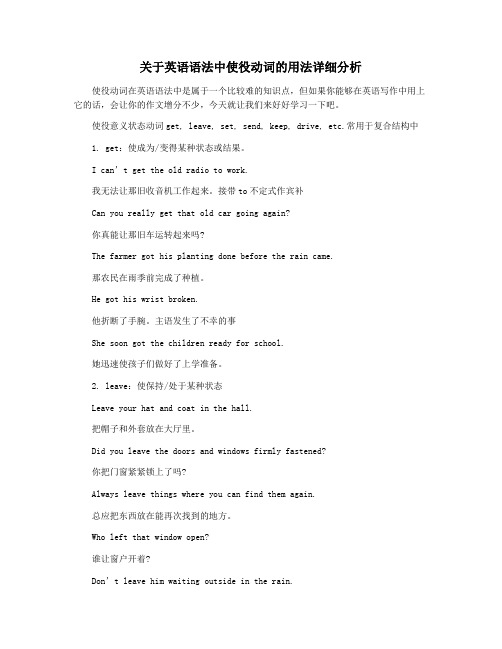
关于英语语法中使役动词的用法详细分析使役动词在英语语法中是属于一个比较难的知识点,但如果你能够在英语写作中用上它的话,会让你的作文增分不少,今天就让我们来好好学习一下吧。
使役意义状态动词get, leave, set, send, keep, drive, etc.常用于复合结构中1. get:使成为/变得某种状态或结果。
I can’t get the old radio to work.我无法让那旧收音机工作起来。
接带to不定式作宾补Can you really get that old car going again?你真能让那旧车运转起来吗?The farmer got his planting done before the rain came.那农民在雨季前完成了种植。
He got his wrist broken.他折断了手腕。
主语发生了不幸的事She soon got the children ready for school.她迅速使孩子们做好了上学准备。
2. leave:使保持/处于某种状态Leave your hat and coat in the hall.把帽子和外套放在大厅里。
Did you leave the doors and windows firmly fastened?你把门窗紧紧锁上了吗?Always leave things where you can find them again.总应把东西放在能再次找到的地方。
Who left that window open?谁让窗户开着?Don’t leave him waiting outside in the rain.别让他在外面雨中等待。
Leave somebody / something alone.不要干涉某人或某事。
3. set:使某人或某物处于或达到某种特殊的状态或关系set somebody at his ease 使某人安逸/舒适/心情放松set something in order 使某物井然有序set somebody free / at liberty 使某人获得自由,释放犯人等It’s time we set the machine going. 是我们发动机器的时候了。
- 1、下载文档前请自行甄别文档内容的完整性,平台不提供额外的编辑、内容补充、找答案等附加服务。
- 2、"仅部分预览"的文档,不可在线预览部分如存在完整性等问题,可反馈申请退款(可完整预览的文档不适用该条件!)。
- 3、如文档侵犯您的权益,请联系客服反馈,我们会尽快为您处理(人工客服工作时间:9:00-18:30)。
• 3). make+宾语+形容词,宾语亦可是从句. • The news made her happy. • He made it clear that he objected to the proposal.
• 2 “半使役动词”amaze, astonish等
• “半使役动词”在英语语法上还是一个没有被认同的概念或术语,而只 是认可了其v-ing形式和v-ed形式作为形容词使用。但这类词汇数量较 大,使用频率高,业已成为学习和考查中的重点、难点、易混易错点, 而且在教学一线已经广泛地被教师和学生所接受。半使役动词之所以 得名,一则它们的意义都有“使某人感到……”,再则是为了与具有特殊 用法的使役动词let, have, make等区别开来。
宾补之间是一种主动关系。而且还可以与情态动词will, would连用,不 用于被动结构。
• The rich lady had the singer eat with his servants. • I will have him come and help you.
• 2). have+宾语+现在分词:表示让某人或物连续进行某动作或处于 某状态中,宾语和宾补是一种主动关系。亦可转化为“劝说,鼓励” 宾语干某事。
• 2.4常见的半使役动词 • amaze(使某人感到惊呀), astonish(使某人感到惊奇), • bore(使某人感到厌倦), complicate(使某人感到复杂), • confuse(使某人感到迷惑), disappoint (使某人感到失望), • delight(使某人感到高兴), discourage(使某人感到气馁), • distinguish(使某人感到显著), excite (使某人感到兴奋), • encourage(使某人感到鼓舞), exhaust (使某人感到疲倦),
英语使役动词用法 详细讲解与练习
• 通常我们说使役动词,指的是make, have, let这三个动词,它们在后 接不定式作宾语补足语时要省去不定式符号to的特定用法。
1 使役动词have, let, make (常用于复合结 构)
• 1.1 have的用法 • 1). have +宾语+省to不定式:表示主语“要”“使”“让”宾语干某事,宾语和
• 2). let+宾语+副词/介词短语作宾补 • Let me in and let them out. • Who let you into the building?
• 3.make的用法 • 1). make +宾语+省to不定式:表示主语“要”“使”“让”宾语干某事,
宾语和宾补之间是一种主动关系。此结构常用被动结构,make后 不接现在分词作宾补。 • The teacher made the naughty boy stand there for an hour. • The naughty boy was made to stand there for an hour.
• 2).make+宾语+过去分词,此结构中的宾语指人时常用到反身代词。 • He raised his voice to make himself heard. • Can you easily make yourself understood in English? • They will make an important plan known to the public soon.
• The two cheats had the lights burning all night long. • He had us waiting for him ree hours yesterday. • I have them all talking to each other in English.
• 3). have +宾语+过去分词:表示主语的主观意志,即主语让别人 为自己完成某事,宾语和宾补是动宾关系。还可以表示主语遭受 到来利或不测的事。
• Tom said he had had his TV set repaired. • Tom had his wallet stolen on the bus yesterday.
• 1.2 let的用法 • 1). let +宾语+省to不定式:表示主语“要”“使”“让”宾语干某事,宾
语和宾补之间是一种主动关系,罕用于被动语态。有时也可指一 种假设。let后不能接现在分词,过去分词作宾补。 • Let them stay in the classroom and do their exercises themselves. • Let AB be equal to CD. 假设AB等于CD.
• frighten(使某人感到恐惧), interest (使某人感到有趣), • inspire(使某人感到刺激), move(使某人感到激动), • please(使某人感到高兴), puzzle(使某人感到不解), • satisfy(使某人感到满意), surprise(使某人感到惊异), • shock(使某人感到震惊), strike (使某人感到震动), • tire(使某人感到疲惫), upset (使某人感到迷惑不解)
• “别人”在句中一般不出现,这是它与结构1)的区别所在。 • 试比较: • Have you washed your clothes? 你洗了衣服了吗?(自己洗) • Have you had your clothes washed? 你叫人洗了衣服了吗?(别人洗)
• 4). have+宾语+形容词/副词/介词短语作宾补 • Please have your tickets ready. • The Emperor had nothing on. • I am sure I’ll have him in the argument.
• 2.2半使役动词的主动式用法:something + vt. + somebody • 如:What surprised him most was her bravery. • His brave deeds moved China. • The exam result satisfied his parents. • The boy’s behavior upset everybody around.
